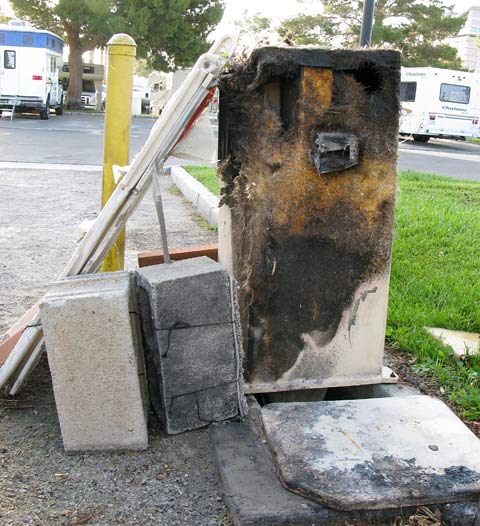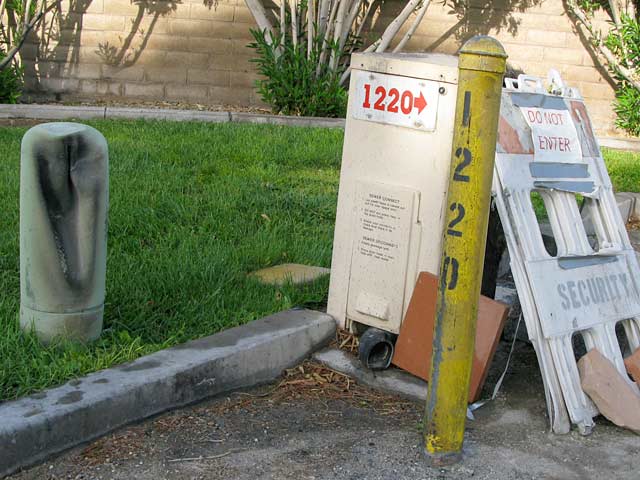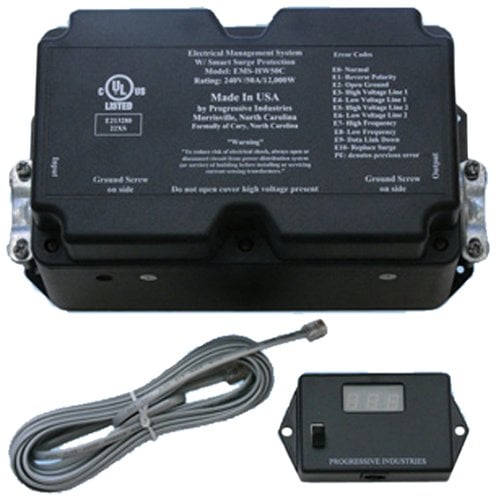Do you go RVing without a surge protector? If so, you’re living on the edge. Here’s an obvious reason why you need a RV surge protector:

RV surge protectors are insurance against the unexpected. Nobody ever expects their RV to catch fire, but accidents happen.
“It is insurance. It is only appreciated if you need it.â€
– GaryKD
iRV2 Forums: Surge Protectors
What RV Surge Protectors Do
RV appliances and electrical systems require a consistent level of voltage to operate safely and effectively. Sometimes that doesn’t happen, like when you plug into a defective RV park pedestal, get hit during a lightening storm or downed power lines affect electricity going into your campground. When voltage drops too low or swings too high, your RV appliances, computers, TVs and more can be severely damaged.

I’ve had 2 motorhomes (over the years) hit by lightning while parked on the pad behind my house. Damaged wiring on both. Once it hit a tree and came in through the ground wire, other came in through the house and the power lines. Since hard wiring the “50amp Surge Guard” HW-RV50, lightning has taken phones and a TV in the house but not affected the MH. It has also dropped low or fluctuating voltage at RV parks. At one dog show it would not connect, voltmeter showed 90 volts at their panel…
– Hooligan
iRV2 Forums: Surge Protectors
Which Kind of RV Surge Protector to Buy?
You can buy two types of protection: RV surge protectors and RV energy management systems (EMS).
RV surge protectors are an entry-level way to protect your rig. They protect your RV from shore power problems at the pedestal and shut down if power supply is dangerously low or high.
For more extensive (and higher-priced) protection, a RV energy management system (EMS) will do the above in addition to managing how and when your appliances use power in order to keep from overloading your RV’s electrical system.
Choosing the right RV surge protector or EMS product is pretty easy. If you have 50 amp service, buy a surge protector for 50 amp RVs. For RVers with 30 amp service, a 30 amp surge protector is sufficient. Costs vary but start at about $100 and go up from there depending on the level of protection. Considering that RV surge protectors can save your RV from electrical problems and even fires, it’s a small price to pay.
The hard part is deciding if you want to hardwire the surge protector into your RV electricity panel, or purchase a portable unit that gets plugged at the end of your RV power supply cable and into shore power. They both have drawbacks and benefits: hardwiring takes some electrical skills and DIY initiative, but it’s practically theft-proof because it goes inside your RV. An exterior RV surge protector-type product that gets plugged into shore power runs the risk of getting stolen unless you purchase an additional product-specific cable lock. You’ll have to decide which one is best for your RVing lifestyle.
Recommended Reading:
iRV2 Forums: Surge Protectors
iRV2 Forums: Which Surge Protector?



The author implies that if he had surge protection he would not have had his two motorhomes damaged by lightening. This is very misleading and makes me wonder if this person is qualified to write about the need of a surge protector. Surge protectors are not designed to protect you from lightening damage.
For example, when I clicked on the link for surge protectors one of the first was one sold under the Camco brand. It clearly states in the specs that it offers up to 2100 joules of protection. (A joules is a unit of measurement of electrical power.). A bolt of lightening can have over 5 billion joules of power. If it hits the right place your surge protector will fry right along with a lot of other things inside your RV.
That being said, I am not saying that you should not have some type of surge protection on your RV. Just don’t think it will help you if you get hit he lightening.
I have a built in surge protector in my rv and when I have my air running the power will shut down and then come back on within a couple minutes. Will it hurt for it to shut down like that or should I not run my air. Only does this when air is on.
I already have a built in surge protector. I have a friend who has been RVing and he told me that not only does he have a built in surge protector but recommends a surge protector at the pedestal. Do I really need a separate one at the pedestal? I am new to RVing.
No mention of the amount of joules one should have for either a 50amp or 30 amp service. Article didn’t do much for me in deciding what surge protector I should buy.